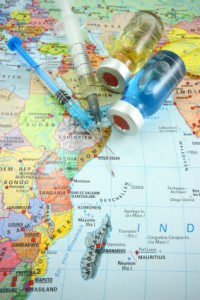 Clinical oncology in Western countries is currently characterized by preventative programs (which include early diagnosis), combined treatments (radio-chemo-surgery), reconstructive surgery, and, more recently, by tailored treatment with monoclonal antibodies or specific inhibitors based on newly identified cancer biomarkers. Clinical oncology in the rest of the world, which represents 85.3% of the Earth’s population, has different priorities, strategies and aims, which are often difficult to compare. Major differences are not only due to the different socio-economical conditions and the national health programs, but also to disparities in cancer burden and their etiopathogenesis, as well the population-based genetic susceptibility. A further major difference is the age-distribution of the population. In the Western world, the population is very much aged, with people aged 65 and over representing 13.5% of the total in USA, 16.4 in Canada and 17.9% in Europe in 2013. On the contrary, in Africa and Asia, which together hold 60% of the total global population, over-65s represent less than 3% or less than 8%, respectively. For these reasons it is critical to highlight the clinical oncology peculiarities of those non-Western regions and let colleagues share their experiences, describe their strategies and express their opinions.
Clinical oncology in Western countries is currently characterized by preventative programs (which include early diagnosis), combined treatments (radio-chemo-surgery), reconstructive surgery, and, more recently, by tailored treatment with monoclonal antibodies or specific inhibitors based on newly identified cancer biomarkers. Clinical oncology in the rest of the world, which represents 85.3% of the Earth’s population, has different priorities, strategies and aims, which are often difficult to compare. Major differences are not only due to the different socio-economical conditions and the national health programs, but also to disparities in cancer burden and their etiopathogenesis, as well the population-based genetic susceptibility. A further major difference is the age-distribution of the population. In the Western world, the population is very much aged, with people aged 65 and over representing 13.5% of the total in USA, 16.4 in Canada and 17.9% in Europe in 2013. On the contrary, in Africa and Asia, which together hold 60% of the total global population, over-65s represent less than 3% or less than 8%, respectively. For these reasons it is critical to highlight the clinical oncology peculiarities of those non-Western regions and let colleagues share their experiences, describe their strategies and express their opinions.

Within the global oncology field, a peculiar position is held by the African countries. Besides the young age of the population, the tropical climate, limited presence of environmental/chemical carcinogens and presence of wild animals determine the occurrence of specific diseases and infections. The factors contribute to a peculiar pattern of cancers, including Burkitt lymphoma and Kaposi’s sarcoma, which have been considered paradigmatic of those regions. Changes in the socio-economical settings and, in particular, the urbanization of an ageing population with later marriages and fewer pregnancies, exposure to chemical carcinogens and a better control of infections are heavily contributing to a new pattern of cancers. The African oncological community must rapidly adapt to the changes, taking advantage of their Western colleagues’ experiences, who could at the same time learn from these changes.
It is for these reasons that Infectious Agents & Cancer is launching a new ‘Clinical Oncology’ section. Edited by Serigne Magueye Gueye and Jan B. Vermorken, this will represent an opportunity to share experiences and information among worldwide oncologists and to identify and develop diagnostic, as well as therapeutic protocols, that are globally valid in the current community. The section will also feature a subsection on African cancers, edited by Henry Wabinga and Twalib Ngoma, which will allow African oncologists to describe the current oncology issues along with their findings/achievements for those “tropical” cancers, such as EBV-related Burkitt lymphoma and schistosomiasis-related bladder cancer, that are considered rare in the rest of the world.
Please submit your manuscript to the section via the online submission system for the journal. Before submitting your manuscript, please read the ‘Instructions for authors’. Please direct any questions regarding journal selection or the series in general to editorial@infectagentscancer.com.
Comments